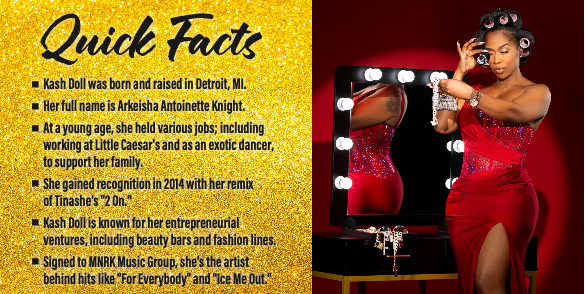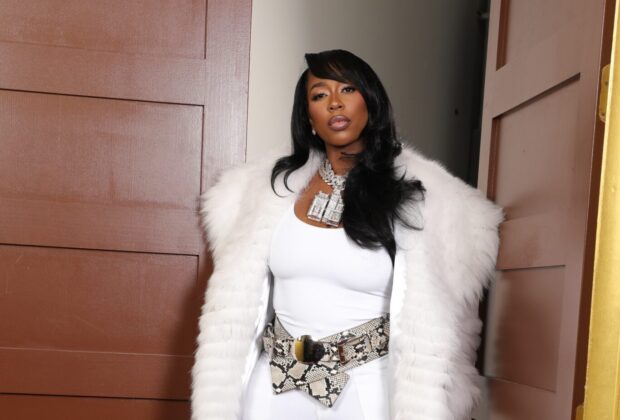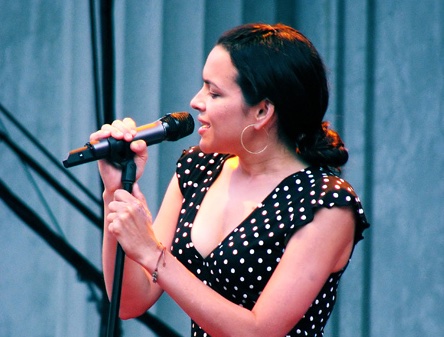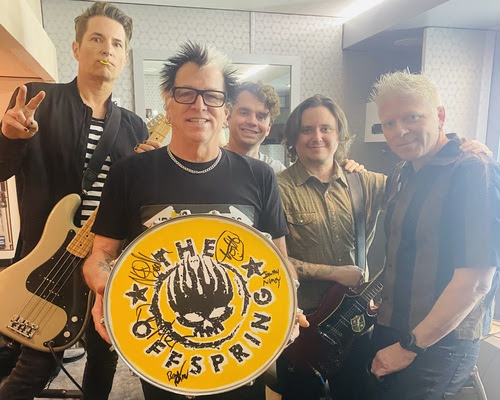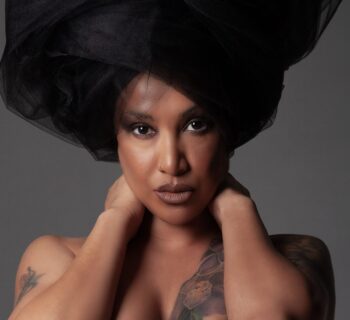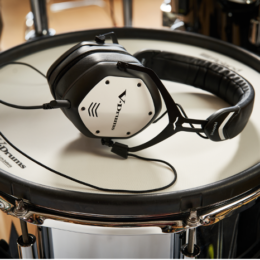The phone rang twice before she picked up, and even through the digital static, Kash Doll's voice carried weight. There's something about Detroit voices; they cut through interference, through noise, through the BS, and hers was no exception. We had scheduled this conversation for 12 p.m. PT on a Tuesday, squeezed between studio sessions and meetings that would determine the trajectory of her expanding empire. But when she answered, there was no rush in her tone, no sense of being pulled in multiple directions. Just presence—pure and undiluted.
"How you doing?" she greeted MC, the warmth immediate but measured. It's the kind of greeting that makes you feel welcome while simultaneously letting you know that respect is earned, not given. This balance between accessibility and boundaries, between vulnerability and strength would define our entire conversation. It's also the balance that has defined her career, allowing her to navigate through an industry that chews up and spits out artists who haven't mastered the art of being open and protected.
Kash Doll doesn't just enter a room, she arrives. Over the phone, I could sense how she was direct and about her business. Though she greeted us warmly, there seemed to be quiet calculation to her presence. Friendly, but slightly guarded, her laughter came easy but brief, always followed by a thoughtful pause like she was making sure not to give too much away too quickly. If her persona on stage is bold, unfiltered confidence, her offstage demeanor is that of a woman who's been through enough to know the value of holding something back. That mix of toughness and vulnerability, poise and punchlines, gave off Detroit vibes which set the tone for our conversation.
The Motor City has always been a place where dreams are forged in fire and tested against the hardest of realities. It's a city that doesn't coddle its children, but instead teaches them to build strength from struggle, to find beauty in the broken, and to understand that survival is the first step toward success. For Kash Doll, born Arkeisha Antoinette Knight, Detroit isn't just her hometown, it's her blueprint, her university, and her constant source of inspiration. Every inflection in her voice, every strategic pause in our conversation, every calculated risk in her career, can be traced back to lessons learned in the streets and neighborhoods that raised her.
Kash is no stranger to adapting. She's had to. The hip-hop world, especially for women, isn't a place that often rolls out red carpets. It's one where you learn to walk over the cracks or fall through them. It's an industry built on respect earned through bars spit and stages conquered, where authenticity isn't just appreciated, it's demanded. Yet here she is, walking tall, having carved out her own lane in a crowded field of pretenders and imitators. And after witnessing her magnetic performance on the Los Angeles leg of her The Last Doll tour, it's hard to deny: Kash Doll is gearing up for her biggest leap yet.

She dominated the Fonda Theatre stage that night, not with gimmicks nor special effects, but with presence. A mix of glamour, grit, and genuine gratitude that transformed the venue into something resembling a Detroit block party crossed with a high-fashion runway show. The crowd wasn't just watching a performance, they were witnessing a master class in charisma. She let her bars fly with raw precision, each line delivered with the kind of confidence that only comes from years of perfecting your craft in rooms where mistakes aren't forgiven, and mediocrity isn't tolerated.
At one point during the show, she handed the spotlight to a fan she pulled from the crowd. He spit a few lines, nervous energy crackling through his voice as hundreds of eyes focused on him. Instead of clowning him or reclaiming the mic too fast, she stood back, applauded, and let him have his moment. It was one of the purest snapshots of who Kash Doll is; confident enough to share the shine, because she knows exactly how bright hers is. It was also distinctly Detroit, a city where community and competition coexist, where lifting others up doesn't diminish your own light, but amplifies it.
In conversation, that same confidence glows in dazzling waves. "I tell everybody, Detroit is who I am," she said with a mix of pride and declaration that felt less like a soundbite and more like a mission statement. Her accent slightly carried the grit of her hometown, and her words were vivid, peppered with laughter and side comments, but always with a thread of seriousness running underneath. "It's raw, it's uncut, it's fashionable, it's loud... it's just real."
That realness isn't something Kash tries to manufacture, it's been earned and embedded over years of grinding it out in Detroit, long before any label deal or television role entered the picture. Every bar she spits, every outfit she wears, every interview she gives carries a piece of the Motor City with it. From the flamboyant car culture that turns four wheels into rolling art installations to the DIY beauty shops that serve as community hubs where gossip flows as freely as hair products, Kash Doll isn't just repping her city, she's archiving it through her art, preserving its essence for a generation that might otherwise miss its magic.
"The hustle in Detroit is different," she explains, her voice leaning forward with intensity that made the phone feel more like a face-to-face conversation. "It's that extra flamboyant side. People see the glitz, but it's backed by grind. Everything we do, we do it big, but we also do it real. There's no fake it ‘til you make it; you either got it or you don't."
That duality, style backed by struggle, glamour grounded in grit, is the foundation of her career and the secret to her authenticity. Growing up as the oldest of six kids in a household where making ends meet required creativity, determination, and an entrepreneurial spirit that couldn't afford to fail, she worked early jobs to support her family: babysitting neighborhood kids, slinging pizza at Little Caesar's, and yes, even dancing in clubs where the money was fast and the nights were long. She's never shied away from that chapter of her story. If anything, she owns it, reframing it as part of her entrepreneurial evolution rather than something to be ashamed of or explained away.
"I've always been about my business," she says, her tone matter-of-fact in a way that suggests this truth was so fundamental it barely needed stating. "Even back then, I wasn't just working for fun. I had a goal. I had dreams. I knew where I was trying to go, and every dollar I made, every connection I formed, every lesson I learned was a step in that direction."
Those early dreams crystallized into action in 2014, when her remix of Tinashe's "2 On" began circulating on local radio stations and gaining traction in the digital underground that was rapidly becoming the new proving ground for emerging artists. It was her first taste of attention outside the club scene, and it hit different. The response wasn't just positive, it was electric, sparking conversations in barbershops and beauty salons, getting spins at house parties and car shows. She knew she had something: voice, presence, a look, and most of all, a story that resonated with people who recognized their own struggles and aspirations in her lyrics.
But the climb wasn't smooth, and success didn't arrive on a silver platter accompanied by industry executives eager to make her dreams come true. "One of the moments I almost gave up was when I got stuck in a contract," she shared, her energy sobering for a moment as she recalled what was clearly a painful period. "I had a friend who told me it was a good move, but I ended up locked down for two years. Couldn't release anything. Couldn't perform certain places. It was rough, man. Really rough."
The frustration was palpable as she recalled that period, a time where her momentum stalled and her voice was silenced by legal red tape that felt more like quicksand than a temporary obstacle. For an artist whose entire identity was built on movement, on progress, on the relentless forward motion that characterized Detroit's hustle culture, being forced into stagnation was torture. But instead of crumbling under the weight of lost time and missed opportunities, she used the forced break to regroup, to study the industry that had temporarily trapped her, and to emerge smarter, stronger, and more determined than ever.
"Most of the time, I don't feel like quitting because I really enjoy what I do," she said, her voice regaining its earlier warmth and energy. "It's always fun for me, making music, performing, seeing my fans light up when they hear something that speaks to them. That love is what keeps me going, even when the business side tries to wear you down."
And the payoff? It came in a moment worthy of any come-up story, the kind of scene that movies are made of. In 2016, when Drake brought her onstage during his Summer Sixteen tour stop in Detroit. The Joe Louis Arena crowd erupted as she stepped into the spotlight, thousands of voices rising in recognition and celebration. "That was crazy," she remembered, and I could hear her smiling through the phone. "Two years after I started taking music seriously, and I'm on stage with Drake in my own city? That was a real moment for me. That was when I knew this wasn't just a dream anymore, it was actually happening."
Moments like that don't happen by accident. They happen to people who've put in the invisible hours, who've perfected their craft in empty rooms and crowded clubs, who've built relationships and maintained authenticity when it would have been easier to compromise. And in an industry that often pits women against each other, creating artificial competition where collaboration should exist, Kash has managed to carve out her lane without mimicking anyone else's formula or stepping on other women to elevate herself.

"Male rappers can say or do whatever, and when women do it, we get called ratchet or nasty," she said, addressing the double standards that continue to plague hip-hop despite decades of evolution. "We have to look flawless all the time. Hair done, makeup done, outfit coordinated. Men can throw on a t-shirt and go perform, and nobody questions their professionalism or their artistry."
But she's not bitter, just observant; a crucial distinction that speaks to her maturity and strategic thinking. "It's more open now," she acknowledged, crediting the women who came before her and the ones rising alongside her. "It's not surprising anymore to see women doing their thing, controlling their narratives, building their empires. And I love that. I love seeing all the girls winning because when one of us wins, we all win."
Despite the increased competition and the crowded field of talented women in hip-hop, Kash's voice cuts through the crowd with clarity. Her delivery is distinct: polished but raw, smooth but biting, commercial but uncompromisingly real. "My sound is authentic," she said plainly, as if stating the most obvious fact in the world. "It's me, no filter, no gimmicks, no trying to be someone else's version of what a female rapper should be."
During our conversation, it felt like Kash moved seamlessly between calculated precision and creative impulse, between the businesswoman who reads contracts and the artist who lets inspiration guide her pen. "Sometimes I hear a beat and I just know what I wanna rap about," she said. "The story comes immediately, like it was waiting for that particular sound to bring it out. Other times I'm just vibing out, letting the melody take me where it wants to go, seeing what comes up. Both approaches work for me because they're both honest to who I am in that moment."
When I asked about her studio setup and recording process, she grinned and waved it off with a laugh that suggested technical details weren't nearly as important as the magic that happens when inspiration strikes: "I'ma text that to you." Even when she withholds information, she does it with charm and humor that makes you feel like you're in on the joke rather than being shut out of the conversation.
She's not one to chase features for clout either, a rarity in an industry where collaboration often feels more strategic than organic. "If I don't like a song, I won't hop on it just because it might be good for my career," she said. "I gotta love the vibe, connect with the energy, feel like I have something meaningful to add. Otherwise, what's the point?"
Her dream collaborations speak to a broader artistic palette and an ear for talent that extends beyond obvious commercial choices: Rihanna, H.E.R., Mariah the Scientist, and Cardi B. "I just started listening to Mariah, and I really like her," she said, her voice carrying the excitement of discovering new music. "Her vibe is different. It's moody but beautiful, vulnerable but strong. That's the kind of energy I want to work with."
But Kash's artistry isn't limited to the booth or the stage. Her sense of style is its own form of storytelling, a visual language that communicates aspects of her personality and artistry that even her lyrics can't fully capture. "It's not how I tell my story, it is my story," she said, her voice taking on an intensity that suggested we were getting closer to something fundamental about her identity. "Every outfit, every photo, every appearance, it's how I feel at that moment, what I want to project, who I am on that particular day."
Whether draped in streetwear that pays homage to Detroit's hip-hop heritage or dressed in couture that would fit seamlessly on a red carpet, Kash wears everything like it was made specifically for her. But fashion, like music, has always been more than aesthetics for her. It's branding, it's identity, it's legacy, a way of controlling her narrative in an industry that often tries to box artists into predetermined categories.
"It came naturally to me," she said. "I didn't sit down and say, 'I'm gonna be a brand.' I just was myself, stayed true to my tastes and my vision, and that became my brand. People connect with authenticity, especially in a world where so much feels manufactured."
Beneath all the flyness and stage presence, there's depth and hard-earned wisdom etched between her bars and woven through her interviews. Her lyrics often pull from real-life lessons: relationships that taught her about loyalty and betrayal, experiences that showed her the difference between self-confidence and self-worth, moments of vulnerability that proved strength comes from acknowledging your struggles rather than pretending they don't exist.
"I want people to say, 'Kash Doll was fly, real, and Detroit,'" she said when I asked about her legacy. "But also that I had something to say in my music, that I wasn't just rapping to hear myself talk. I want my words to mean something, to help someone, to make people think or feel or move differently."
In a digital world defined by noise, constant connectivity, and the pressure to always be "on," Kash prioritizes mental clarity and emotional boundaries with the discipline of someone who's learned these lessons the hard way. "Protecting my peace means not allowing negativity in my circle," she said. "I focus on what makes me happy, what feeds my soul, what moves me closer to my goals. You can't avoid the negative completely, it's everywhere, but how you respond to it, how much power you give it, that's where your control is."
Over time, she's learned to run her career like a CEO rather than just an artist, understanding that talent alone isn't enough to sustain long-term success in an industry that can feel like it's as much about business acumen as creative ability. "Spending habits, taking things personally, poor time management, I had to grow past all of that," she admitted with the candor of someone secure enough to acknowledge her evolution. "Now, I think things through more carefully. I ask more questions. I read the fine print. Lawyers are involved in every major decision. I've learned to handle my business the right way."
That business-minded approach is guiding her next era, one that expands beyond music into territories that will allow her to build generational wealth and influence. In 2025, she's set to unveil a new television project, though she remains characteristically tight-lipped about details that could spoil the surprise. "It's hush-hush right now," she said, and I could hear her smiling through the mystery. "But it's coming, and it's gonna be special. I'm dropping new products, too. Some real exciting stuff that I think people are gonna love."
Motherhood, too, has redefined her commitment and sharpened her focus in ways that surprise even her. "It changes your perspective completely," she said. "You move differently, with more purpose, because you're not just thinking about yourself anymore. But it hasn't slowed me down, if anything, I'm more focused, more driven, because I'm building something for my child to be proud of."
So what does the next level look like for Kash Doll? More music that pushes boundaries while staying true to her Detroit roots, more business ventures that leverage her brand and expand her influence, more strategic moves made on her own terms with her own team calling the shots.
"I'm not just chasing success," she said as our conversation wound down, her voice carrying the quiet confidence of someone who's already won battles most people never even realize they're fighting. "I own it. I define it. I control it."
Kash Doll isn't interested in fitting into anyone's mold or following someone else's blueprint for what a successful female rapper should look like, sound like, or aspire to become. She's carving out a kingdom from Detroit concrete and gold-trimmed dreams, building an empire that honors her past while securing her future. In an era of copycats and curated facades, manufactured personas and algorithmic artistry, she's the rare original; not waiting for a seat at the table because she's too busy building the whole damn house.
As our call ended and the line went quiet, we were left with the distinct impression that we'd just spent time with someone who understands something fundamental about success that eludes many of her peers: it's not enough to be talented, or even to be authentic. You have to be strategic. You have to be patient. You have to be willing to evolve without losing yourself, to adapt without compromising your core values, to play the game without letting the game play you.
Kash Doll has mastered that balance, and as she prepares for her next chapter, one thing is certain: Detroit raised her right, and she's about to show the world exactly what that means.
Follow her on social media: @kashdoll – TikTok, Instagram, X, Snapchat: IAM_KASHDOLL
